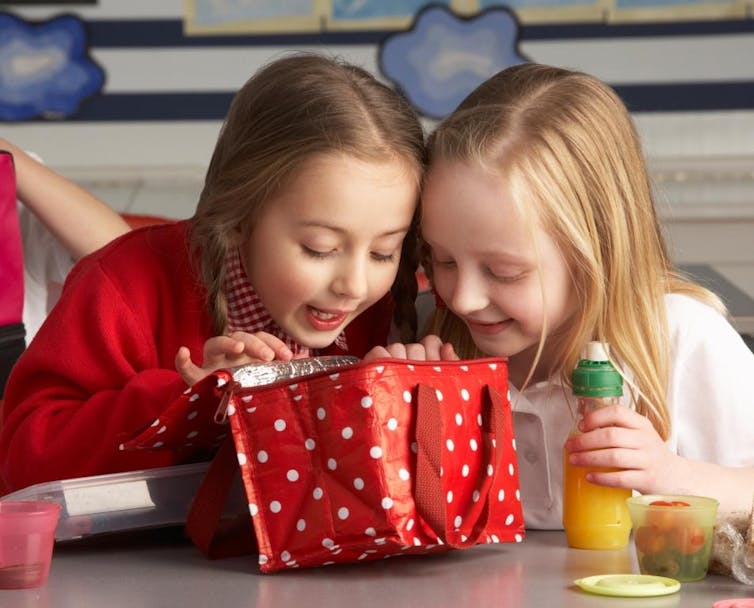7 ways to make Easter safe and inclusive for children with food allergies
- Written by Prathyusha Sanagavarapu, Senior Lecturer, Early Childhood Education, Western Sydney University
Easter can be a challenging and anxious time for children with food allergies and their families.
First, there are the foods we commonly associate with Easter — chocolate and hot cross buns. Then, Easter is a time when families and friends come together. So celebrations at home, at daycare or at school can include a spread of other foods containing common allergens, including dairy, eggs, peanuts and tree nuts.
However, there are many things parents and educators can do to help make Easter safe and inclusive for children with food allergies and their families.
Read more: Curious Kids: How do we get allergic to food?
Kids’ food allergies are common, and becoming more so
The prevalence of food allergies is on the rise globally, particularly among wealthy, westernised nations.
Food allergies and related hospital admissions among Australian children have increased significantly since the 1990s. Some 11% of one-year-olds and 4% of pre-schoolers have a diagnosed food allergy. One study in the ACT showed one in 30 children starting school had a severe nut allergy.
Nine foods cause the vast majority of allergic reactions in Australia: cow’s milk, eggs, peanuts, tree nuts (such as cashews and walnuts), soy, sesame, wheat, fish, and shellfish (such as prawns and crab).
Allergic reactions can range from mild, such as watery eyes or itchiness, to anaphylaxis, the most severe form of allergic reaction. Anaphylaxis involves breathing difficulties and can be life-threatening.
How do allergies affect families?
A food allergy doesn’t just affect the child; it can have a psychosocial effect on the whole family.
Fear of a severe allergic reaction may drive parents and caregivers to exclude children from special events and celebrations, such as school camps, excursions, or birthday parties. Some parents also stop sending their child to school.
They may be concerned life-saving medication (such as the adrenaline auto-injector EpiPen) may be delayed or not available, or worry their young child may not be able to resist temptation, particularly when their friends offer food. This might be because children with allergies are afraid of being labelled “different” or they don’t understand the risk.
In the words of one review study, for affected families, social events can “have a different meaning […] giving rise to feelings of exclusion and difference”.
 Parents worry about their children sharing food or accessing life-saving medication.
Shutterstock
Parents worry about their children sharing food or accessing life-saving medication.
Shutterstock
It’s important children are included
Celebrations can help to foster friendships, family relationships, and are vital for children’s socio-emotional development and well-being. So, children should not be left out or excluded from celebrations and events because of their allergy.
Other children also benefit when children with additional needs are included. They can learn to appreciate and develop empathy and tolerance for differences — traits that need to be nurtured in children in the early years.
Read more: Empathy starts early: 5 Australian picture books that celebrate diversity
Some tips for parents and educators
Take the focus off food when celebrating Easter by organising a non-food Easter egg hunt, such as for stuffed bunnies or toys, or other activities like Easter-themed arts, crafts, and dress-ups. However, craft items including eggshells, egg cartons, milk cartons, peanut butter jars and lids may still pose an allergy risk
consider non-food treats for all children, such as stickers or story books
if you’ve invited a child with allergies, ask their parents to provide alternative, allergy-safe treats for their child if food treats are to be distributed to other children. Sometimes, parents of the child with a food allergy offer to provide the same treats for everyone so their child is not getting something different (always check with other parents of children with food allergies first)
if you’re an educator, check parents are happy for you to give food treats to the child with a food allergy, after reading ingredient labels, and after following a strict process developed with the family. Look for hidden ingredients in packaged foods and understand what each label means. For example, whey is a protein in cow’s milk and a child with cow’s milk allergy needs to avoid it. Encourage all children to eat Easter loot at home so parents can check ingredients
encourage all children to wash their hands before and after eating. Peanut protein, for example, can last on hands for three hours after eating. Hand washing with soap, not just water, can help reduce the risk of cross-contamination
make sure children know they must not share food or drink bottles
if a child shows signs of an allergic reaction, parents and educators should follow instructions in the child’s individual allergy management plan. So, make sure your child has one, it is up to date, and people know what to do in an emergency.
With some planning, empathy and a management plan, Easter can be a joyful and safe celebration for children with food allergies and their families.
Read more: I think my child has outgrown their food allergy. How can I be sure?
For more information on allergy and anaphylaxis, contact Allergy & Anaphylaxis Australia, 1300 728 000; or the Australasian Society of Clinical Immunology and Allergy.
Authors: Prathyusha Sanagavarapu, Senior Lecturer, Early Childhood Education, Western Sydney University





